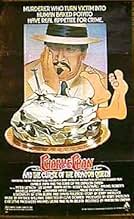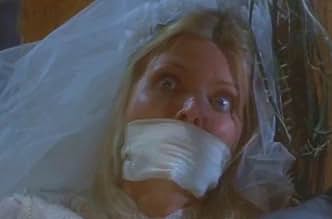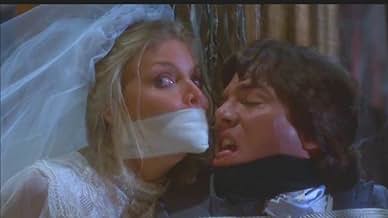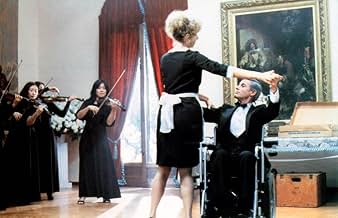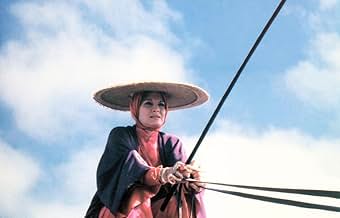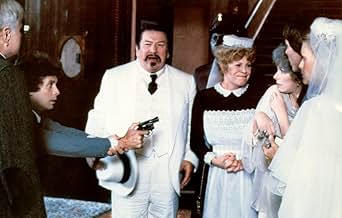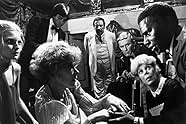NOTE IMDb
4,1/10
1,6 k
MA NOTE
L'inspecteur Charlie Chan aide le SFPD à résoudre les nombreux meurtres bizarres. Son maladroit petit-fils Lee, qui va se marier, lui donne un coup de main. La Reine Dragon est-elle derrière... Tout lireL'inspecteur Charlie Chan aide le SFPD à résoudre les nombreux meurtres bizarres. Son maladroit petit-fils Lee, qui va se marier, lui donne un coup de main. La Reine Dragon est-elle derrière tout cela ?L'inspecteur Charlie Chan aide le SFPD à résoudre les nombreux meurtres bizarres. Son maladroit petit-fils Lee, qui va se marier, lui donne un coup de main. La Reine Dragon est-elle derrière tout cela ?
- Réalisation
- Scénario
- Casting principal
- Récompenses
- 1 nomination au total
Avis à la une
During the 1930s Charlie Chan films were extremely popular with Asian American audiences; by the 1980s a later generation derided them for their use of Caucasian actors Warner Oland and Sidney Tolar in the title role. CHARLIE CHAN AND THE CURSE OF THE DRAGON QUEEN attempts to play to both sides of the coin, acting as both homage and parody of the original films. Not surprisingly, when released in 1981 it pleased neither.
Set in San Francisco, DRAGON QUEEN finds Chan called out of retirement in Hawaii to uncover a serial killer whose trademark is "bizarre deaths;" he is assisted by his grandson, a bumbling Lee Chan Jr. who proves as much hindrance as help. Like most films that do not fulfill their promise, the problem begins with the script: it never really references the Chan films in any significant way, nor does it ever develop the fangs required of an effective parody. Nor are the two leads well suited to their roles: both Peter Ustinov and Angie Dickinson are wildly out of place as Chan and the Dragon Queen, utterly unfunny in every imaginable way.
The saving grace of the film is in the supporting players. Perhaps the single most successful performer is Lee Grant in the role of Jimmy Jr.'s maternal and very Jewish grandmother. Grant aside, the always memorable Roddy McDowell and the brilliant Rachel Roberts jolt their every scene to life; Brian Keith plays against type as a hysterical and wildly profane police officer; and Richard Hatch is surprisingly good as Chan's bumbling grandson. Michelle Pfeiffer, in one of her earliest roles, is thrown in for good measure--and while the script gives her little to do beyond look pretty and giggle she does both extremely well.
Even so, this is not enough to save the film, which slowly but surely dissolves into a morass of very obvious slapstick humor; when all is said and done, the end result is rather like THE GOOD EARTH MEETS THE PINK PANTHER. It has moments, but it is more awkward than amusing. Four stars for the efforts of Lee Grant, Roddy McDowell, Rachel Roberts and company, but--and in the words of the original screen Chan--most viewers should say "Thank you so much!" and pass along another way.
GFT, Amazon Reviewer
Set in San Francisco, DRAGON QUEEN finds Chan called out of retirement in Hawaii to uncover a serial killer whose trademark is "bizarre deaths;" he is assisted by his grandson, a bumbling Lee Chan Jr. who proves as much hindrance as help. Like most films that do not fulfill their promise, the problem begins with the script: it never really references the Chan films in any significant way, nor does it ever develop the fangs required of an effective parody. Nor are the two leads well suited to their roles: both Peter Ustinov and Angie Dickinson are wildly out of place as Chan and the Dragon Queen, utterly unfunny in every imaginable way.
The saving grace of the film is in the supporting players. Perhaps the single most successful performer is Lee Grant in the role of Jimmy Jr.'s maternal and very Jewish grandmother. Grant aside, the always memorable Roddy McDowell and the brilliant Rachel Roberts jolt their every scene to life; Brian Keith plays against type as a hysterical and wildly profane police officer; and Richard Hatch is surprisingly good as Chan's bumbling grandson. Michelle Pfeiffer, in one of her earliest roles, is thrown in for good measure--and while the script gives her little to do beyond look pretty and giggle she does both extremely well.
Even so, this is not enough to save the film, which slowly but surely dissolves into a morass of very obvious slapstick humor; when all is said and done, the end result is rather like THE GOOD EARTH MEETS THE PINK PANTHER. It has moments, but it is more awkward than amusing. Four stars for the efforts of Lee Grant, Roddy McDowell, Rachel Roberts and company, but--and in the words of the original screen Chan--most viewers should say "Thank you so much!" and pass along another way.
GFT, Amazon Reviewer
I liked the Charlie Chan movies I remember watching on television when I was growing up, I like Peter Ustinov very much and I thought it a very bold stroke to have Angie Dickinson play the "Dragon Queen" (a role made for the likes of a Lucy Liu).
That's why I'm irritated by having rented this movie. It's just awful - truly truly awful. You'll sigh, you'll look at your watch, you'll feel as if you're stuck with some adolescent in an elevator trying out his impressions for 17 hours until they free you.
Don't rent it - it's just TERRIBLE - and with this cast, that's such a shame.
That's why I'm irritated by having rented this movie. It's just awful - truly truly awful. You'll sigh, you'll look at your watch, you'll feel as if you're stuck with some adolescent in an elevator trying out his impressions for 17 hours until they free you.
Don't rent it - it's just TERRIBLE - and with this cast, that's such a shame.
If the A.F.I. decides to vote on the 100 best kisses in American Film, they have to put Richard Hatch's and Michelle Pfeiffer's kiss in the top ten. Not only are we talking tung, but a 45 second smooch that makes the viewers laugh as well as cry. Fast forward to this scene first, the rest of the film can wait.
This thing is no fun whatever.
Too bad, because it had a lot going for it.
First, there is the Charlie Chan legacy. It was something that walked with the movie-going public during that decade when our current notions of visual narrative evolved. It wasn't particularly influential except for the early notion that our on-screen eye differed from those around him in matters of cognition encoded visually by race. The explicit irony was the Chineseness of the man was deliberately bogus.
Second there's the appearance of Peter Ustinov. For this bit, you have to know the absolute importance of the fictional Hercule Poirot in how film discovery evolved. Ustinov had just played Poirot in the to-then most high budget detective story filmed. So when we see him (or did when this was new) as a similarly portly, pretentious, internally cogitating detective, it matters.
Third, someone involved was intelligent enough to set the thing properly. It begins with a faded black and white "old-style" Chan movie with our modern characters but a couple decades previously. The mystery shown bears on the one in our movie. Later, at the end of our movie, the action takes us to an old moviehouse in Chinatown where a Charlie Chan movie festival is being held. (No mention in our film that Chan has a film persona.) The trademarked end (copied from Poirot) where Chan gathers all the suspects and tells each one why they are the murderer, until revealing the real murderer (after a separately scripted false alarm) this happens in the scenery loft of the theater where a Chan film is playing below.
Naturally the chase to catch the murderer takes each character in front of the giant screen where the audience applauds them.
But its the truest of parodies. Usually parodies put new life into old form by adding a new layer of reference. Its a mistake to think that the "new life" would be funny, or more entertaining in any way. This is true parody: it took something that was dead and added enzymes to the decomposition.
There's one joke I appreciated. The Chan films are generally pretty vile in how they handle race. One trick is to set the bottom racially so that Chan can drift at the top in some cerebral racial advantage. That meant that the black driver was nearly subhuman. Stupid, ignoble.
The driver here is a black man also. Poised, attractive, articulate. We learn some noble things about him at the end.
Oh, another small matter of interest. It has a very young Michelle Pfeiffer, very pretty before she had all that work done on her face.
Ted's Evaluation -- 1 of 3: You can find something better to do with this part of your life.
Too bad, because it had a lot going for it.
First, there is the Charlie Chan legacy. It was something that walked with the movie-going public during that decade when our current notions of visual narrative evolved. It wasn't particularly influential except for the early notion that our on-screen eye differed from those around him in matters of cognition encoded visually by race. The explicit irony was the Chineseness of the man was deliberately bogus.
Second there's the appearance of Peter Ustinov. For this bit, you have to know the absolute importance of the fictional Hercule Poirot in how film discovery evolved. Ustinov had just played Poirot in the to-then most high budget detective story filmed. So when we see him (or did when this was new) as a similarly portly, pretentious, internally cogitating detective, it matters.
Third, someone involved was intelligent enough to set the thing properly. It begins with a faded black and white "old-style" Chan movie with our modern characters but a couple decades previously. The mystery shown bears on the one in our movie. Later, at the end of our movie, the action takes us to an old moviehouse in Chinatown where a Charlie Chan movie festival is being held. (No mention in our film that Chan has a film persona.) The trademarked end (copied from Poirot) where Chan gathers all the suspects and tells each one why they are the murderer, until revealing the real murderer (after a separately scripted false alarm) this happens in the scenery loft of the theater where a Chan film is playing below.
Naturally the chase to catch the murderer takes each character in front of the giant screen where the audience applauds them.
But its the truest of parodies. Usually parodies put new life into old form by adding a new layer of reference. Its a mistake to think that the "new life" would be funny, or more entertaining in any way. This is true parody: it took something that was dead and added enzymes to the decomposition.
There's one joke I appreciated. The Chan films are generally pretty vile in how they handle race. One trick is to set the bottom racially so that Chan can drift at the top in some cerebral racial advantage. That meant that the black driver was nearly subhuman. Stupid, ignoble.
The driver here is a black man also. Poised, attractive, articulate. We learn some noble things about him at the end.
Oh, another small matter of interest. It has a very young Michelle Pfeiffer, very pretty before she had all that work done on her face.
Ted's Evaluation -- 1 of 3: You can find something better to do with this part of your life.
This is not a great movie, yet my wife and I laughed ourselves into pain. The great Peter Ustinov spins his previous role in oriental parody from "One Of Our Dinosaurs Is Missing"; Richard Hatch creates the most incompetent bumbler in decades of motion picture bumblers with some hilarious slapstick results; Lee Grant is a gorgeous grandmother; Roddy McDowell is the supercilious butler in a motorized wheelchair; and Michelle Pfeiffer is a ditzy Goldie Hawn clone - as well as being luminously beautiful and excellent at playing a brainless idealist just perfectly designed for the klutzy Lee Chan Jr. It is designed for fans of Charlie Chan, and it is a parody, but a loving one. The topical references are side-splitting; it helps to be old enough to have been an adult in 1981. The references to other movies abound, some subtle some obvious. The visual humour is on the level of slaps with a halibut but fun nonetheless. I gather the movie was a critical and box office flop. Even I missed it back then but I find it a guilty pleasure to disagree with almost everyone else on earth (except my wife, and that is what counts for more!): I enjoyed this idiotic little movie. And the dog deserved an Oscar.
Le saviez-vous
- AnecdotesIn the Shanghai bar scene, Lee Chan, Jr. (Richard Hatch) orders a "Captain Apollo on the rocks." Captain Apollo was Hatch's character on Galactica (1978).
- Gaffes(1:23:58) The text of the newspaper clipping ("Pineapple King In Love Tryst") doesn't reference the case in the slightest.
- Citations
Charlie Chan: Process of aging never agreeable, but better than alternative.
- ConnexionsEdited into How American Cinema Changed Hollywood Forever (2003)
- Bandes originalesHappy Birthday to You
Written by Patty S. Hill and Mildred J. Hill
Performed by Michelle Pfeiffer and Richard Hatch
Meilleurs choix
Connectez-vous pour évaluer et suivre la liste de favoris afin de recevoir des recommandations personnalisées
- How long is Charlie Chan and the Curse of the Dragon Queen?Alimenté par Alexa
Détails
- Date de sortie
- Pays d’origine
- Langue
- Aussi connu sous le nom de
- Charlie Chan i kletva zmajske kraljice
- Lieux de tournage
- Sociétés de production
- Voir plus de crédits d'entreprise sur IMDbPro
Contribuer à cette page
Suggérer une modification ou ajouter du contenu manquant

Lacune principale
By what name was Charlie Chan and the Curse of the Dragon Queen (1981) officially released in India in English?
Répondre
